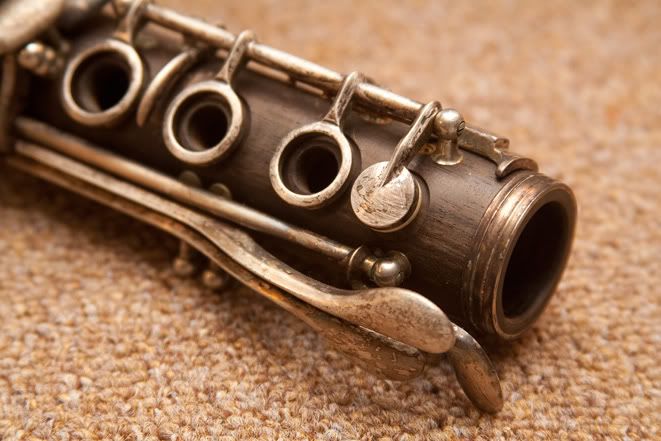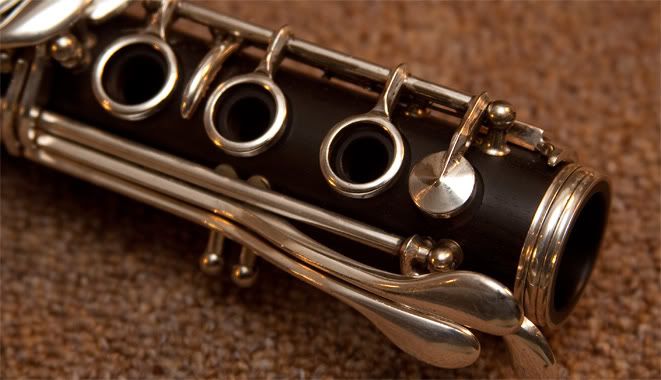 The Clarinet BBoard The Clarinet BBoard
|
Author: Clarineteer
Date: 2012-09-03 17:45
I was speaking with a tech the other day and he said that once grenadilla wood loses its oil it can never be put back in. Any thoughts on that.
|
|
Reply To Message
|
|
Author: Clarineteer
Date: 2012-09-03 17:57
He is not my tech. We were just discussing various aspects of the clarinet.
|
|
Reply To Message
|
|
Author: Ken Shaw ★2017
Date: 2012-09-03 17:57
Hans Moennig kept a block of grenadilla in a bucket of oil for 50 years. When anyone asked him about bore oil, he pulled out the block, shaved off a paper-thin slice and showed the questioner that the oil hadn't penetrated even that far.
Ken Shaw
|
|
Reply To Message
|
|
Author: Garth Libre
Date: 2012-09-03 18:02
Lots of the pros who advertise on this board recommend a vegetable type oil which is hydrophilic, like sweet almond oil or olive oil. Supposedly gradually treatments with these kinds of oil will attract and retain moisture. Wood can re absorb moisture and oils and I can't think of any reason why a tech would say the fluids only travel one way (out). Logic tells us that grenadilla wood swells and contracts with fluids all the time and we can see it even in an hour or so each time when we play.
Garth, 305-981-4705. garthlibre@yahoo.com
|
|
Reply To Message
|
|
Author: Clarineteer
Date: 2012-09-03 18:02
Thats what this tech said it might help the surface but thats about it.
Actually this particular tech had some great ideas and a great shop which he was kind enough to give me a tour.
Post Edited (2012-09-03 18:06)
|
|
Reply To Message
|
|
Author: Caroline Smale
Date: 2012-09-03 19:57
I guess that if you protect the surface then the interior can look after itself.
The purpose of oiling is not to saturate the entire wood but to provide a boundary layer that prevents undue changes in water absorption of the wood.
I have seen many clarinet bores where the upper section of top joint is grey and parched from the constant bombardment of hot moist breath over the years, and is usually warped inwards i.e. bore is constricted at this most critical point.
|
|
Reply To Message
|
|
Author: clarinetguy ★2017
Date: 2012-09-04 02:32
Norman, your explanation makes a lot of sense, and I think you're describing my clarinet. For too many years, I did no oiling because I was constantly told not to. The upper section of my top joint has that gray and parched look, and it may be slightly warped in the way you describe. I have recently begun to oil it regularly with an organic bore oil, and it may be helping. It certainly doesn't hurt.
My theory, for what it's worth, is that it's a good idea to do fairly regular oiling, especially in the upper joint. When I look at the bore of my clarinet a few weeks after oiling, the bell and the lower joint look fine, but the top of the upper joint always has that gray and parched look.
|
|
Reply To Message
|
|
Author: Campana
Date: 2012-09-04 09:17
Most clarinets don't dry out. they just just vary their moisture content between upper and lower limits. If the wood really did dry out, literally, there would be chemical changes that would be irreversible. Perhaps that's what the OP's tech guy was getting at.
|
|
Reply To Message
|
|
Author: Chris J
Date: 2012-09-04 12:44
Below is a picture of a clarinet that had not been well cared for. Nobody could deny that the surface looks dry (and the bore was the same).

Does the oil penetrate? Well, repeated light applications of oil disappearing overnight suggests that it does get absorbed at least as a surface barrier. It did not evaporate overnight, and a point came when a light coating remained the next morning (indicating job done, for me)
This resulted in the same instrument below - no dye, just oiled.

Chris
|
|
Reply To Message
|
|
Author: tictactux ★2017
Date: 2012-09-04 12:49
> This resulted in the same instrument below - no dye, just oiled.
As you can see, oiling not only takes care of the wood, but of tarnished keys as well! ![[toast]](http://test.woodwind.org/clarinet/BBoard/smileys/smiley15.gif)
Joking aside, unprotected wood suffers from wetting / drying cycles. This is a tad different from what happened to Mr. Moenning's block in the bucket.
--
Ben
|
|
Reply To Message
|
|
Author: The Doctor ★2017
Date: 2012-09-04 21:12
(Disclaimer - I sell a plant derived bore oil and genuine Grenadilla Oil)
No disrespect to Hans Moenig but IMO he was using the wrong kind of oil. Using flourescent tagged plant derived oil, letting it soak in overnight, and then taking a microtome to make thin slices and viewed under a flourescent microscope it can be shown that certain plant oils will penetrate deeply into Grenadilla wood.
Natural oils, since they were designed by Nature to interact with water in plants, can be washed away over time. The natural oil in Grenadilla helps maintain a water balance in the wood and expells excess water - mainly through pores in the wood, and can absorb and hold water within the wood under drying conditions. Too much drying can remove too much moisture and oil can be lost from the wood under heat and drying conditions too.
So, beside the cosmetic appearance, a proper oil balance in the wood also helps maintain a proper moisture balance in the wood which also maintains the original dimensions of the wood when it was cut to make the clarinet form. Some wood looses moisture and oil differently than other pieces of wood used to make the clarinet so it is prudent to oil the pieces and observe their absorption rather that a full swipe of the whole clarinet.
L. Omar Henderson
www.doctorsprod.com
www.chedevillemp.com
|
|
Reply To Message
|
|
Author: repairtechjosh
Date: 2018-08-02 03:00
Chris J what kind of oil did you use on that particular horn? I have a vintage R-13 I'm refurbishing and the wood on mine isn't quite as dried out as the one you have pictured there. In the repair world, there are 15 different ways to skin a cat when it comes to moisturizing and oiling clarinets and everyone has a different idea and I can't quite pin down what is correct. I'd like to use a natural oil instead of your generic C.G. Conn Bore Oil. Anything you'd recommend?
|
|
Reply To Message
|
|
Author: Bob Bernardo
Date: 2018-08-02 03:42
Yes some oils do penetrate wood differently. Yes dried out clarinets can warp. I've made reamers to fix the warps, but you have to use oils first. If the horns warp often they play out of tune.
Designer of - Vintage 1940 Cicero Mouthpieces and the La Vecchia mouthpieces
Yamaha Artist 2015
|
|
Reply To Message
|
|
Author: alanporter
Date: 2018-08-02 04:48
Isn't it time we stopped using wooden instruments ? With all the problems they create ? Do rubber or various types of plastic sound any worse ?
I don't believe so. There is a lot of unscientific nonsense talked on this website.
tiaroa@shaw.ca
|
|
Reply To Message
|
|
Author: alanporter
Date: 2018-08-02 04:49
Isn't it time we stopped using wooden instruments ? With all the problems they create ? Do rubber or various types of plastic sound any worse ?
I don't believe so. There is a lot of unscientific nonsense talked on this website.
tiaroa@shaw.ca
Post Edited (2018-08-02 04:52)
|
|
Reply To Message
|
|
Author: dorjepismo ★2017
Date: 2018-08-02 05:31
People say lots of stuff. If it sounds good, it is good. If it doesn't sound good, try to do something, and if nothing works, get another instrument. Peter Eaton says never oil your instrument, because it doesn't do anything. Jochen Seggelke says oil it whenever it looks dry, which might be about once a month. I can say I've used the Doctor's oil and if you use oil, it's a very good way to go. Haven't tried his grenadilla oil, but that might be what you're looking for.
|
|
Reply To Message
|
|
Author: Chris J
Date: 2018-08-02 11:47
Repairtechjosh
I used The Doctor's bore oil (see post, 2 below my pictures). I still do.
Chris J
|
|
Reply To Message
|
|
The Clarinet Pages
|
 |




![[toast]](http://test.woodwind.org/clarinet/BBoard/smileys/smiley15.gif)
